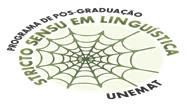Banca de DEFESA: DINAURA BATISTA DE PÁDUA
Uma banca de DEFESA de DOUTORADO foi cadastrada pelo programa.DISCENTE : DINAURA BATISTA DE PÁDUA
DATA : 01/03/2024
HORA: 08:00
LOCAL: Web-conferência
TÍTULO:
PORTUGUESE AS WELCOMING LANGUAGE FOR DEAF STUDENTS: (ABOUT) EXPERIENCES BETWEEN SIGNS AND WORDSPALAVRAS-CHAVES:
Welcoming Language. Libras. Portuguese Language. Culture. Identity.
PÁGINAS: 130
GRANDE ÁREA: Lingüística, Letras e Artes
ÁREA: Lingüística
SUBÁREA: Lingüística Aplicada
RESUMO:
This study focuses on proposing institutional welcoming strategies for deaf students in the educational context in the State of Mato Grosso. To contextualize the choice of the theme, it is worth mentioning that with the recognition of Brazilian Sign Language (Libras) as the natural language of deaf Brazilians (Law 10.436/2002 and Decree 5.626/2005), there began, nationwide, in 2006, the creation of undergraduate courses aimed at training teachers and Libras interpreters. This new context has brought an increasingly significant number of deaf students and teachers into higher education classrooms, creating an environment of interaction between individuals using two distinct languages, Libras and Portuguese, which have disparate modes of perception and production. Libras is visuospatial, while Portuguese is oral-auditory—thus, creating a bilingual and bimodal environment. This scenario has become a broad field of research due to the involvement of different languages, cultures, and identities interacting in situations of constant distancing and closeness. This highlights the need for concrete reflections on pedagogical practices for the teaching and learning of Portuguese, aiming to meet the specific demands of deaf and hearing students in the same educational space. To underpin our thesis, we draw on the theoretical foundation of Barbosa and São Bernardo (2017), using the term "Portuguese as a Welcoming Language." This term is a specialty in the research and teaching of Portuguese designed for foreigners seeking refuge in Brazil, lacking knowledge of a new language to restart their lives in the hosting country. The connection with this term is justified by the similar social vulnerability that deaf Brazilians experience daily, facing linguistic barriers in various situations where knowledge of the written form of Portuguese is essential. In the academic environment, it is observed that deaf students enter higher education with significant gaps in their knowledge of the written form of Portuguese and Libras, as these subjects have been absent (until now) from Basic Education. These language gaps affect the development of any knowledge, leading to constant conflicts and misunderstandings in various communication situations, generating traumas and reinforcing stigmas that further distance deaf and hearing Brazilians due to their use of different languages. From the perspective of a mixed-race, transdisciplinary/interdisciplinary and transgressive Applied Linguistics, this is research of an applied nature, with a qualitative and ethnographic approach, exploratory, bibliographic, documentary. The outcome of this research aims to contribute to advancements in pedagogical practices in bilingual and bimodal environments, promoting teaching that is more suitable for the specific needs and potentialities of this target audience.
MEMBROS DA BANCA:
Presidente - 314.500.911-72 - LUCIA MARIA DE ASSUNÇÃO BARBOSA - UNEMAT
Interno - 132024003 - ANA CAROLINA DE LAURENTIIS BRANDAO
Interno - 132146001 - BARBARA CRISTINA GALLARDO
Externo à Instituição - HILDOMAR JOSÉ DE LIMA -
Externo à Instituição - JOÃO FÁBIO SANCHES SILVA - UEMS
Externo à Instituição - PRISCILLA ALYNE SUMAIO - UFMT



